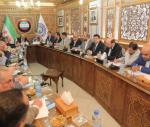You are here
Haqiq initiative aims to develop young people’s skills, civic mindedness
By Dana Al Emam - Aug 06,2017 - Last updated at Aug 06,2017

Executive Manager of Haqiq Initiative Imad Saqqa (left), members of the initiative Batoul Nassar and Sadeq Nidal (far right) speak to The Jordan Times during a recent interview (Photos by Osama Aqarbeh)
AMMAN — Amman resident Sadeq Nidal believes he has a “second family” and a “second home” in each governorate across the country, thanks to the Crown Prince Foundation’s (CPF) Haqiq Initiative.
The third year civil engineering student, joined the initiative five years ago while still a 10th grader, where he met peers from all over the country in training camps.
Since then he has been able to see its positive impact on his skills, behaviour and mindset on a daily basis.
Haqiq, which means “worthy” or “deserving” in Arabic, is CPF’s “engine on the ground” that attracts young people at an early age and engages them in a “long journey” to become part of a sustainable community that leads by action and influences others, according to the foundation’s CEO Nour Abu Ragheb.
In a recent interview with The Jordan Times, she added that the programme is driven by the strategic focus of the foundation to develop the life skills of young people and equip them with the right tools to lead change within their communities.
“The Haqiq programme works to instill values, provide required skills and tools, and create the right surrounding environment and supporting ecosystem for young people to unleash their potential to drive change as they see their aspirations and future,” she said.
As one of 450 “knights” selected from over 120 public schools, Nidal considers the initiative an investment in the younger generation, which translates their positive energies into constructive efforts, which help them become more productive citizens and give back to the community.
“My involvement in the initiative has helped me become more resilient to the daily issues facing me and has encouraged me to see the positive side of every problem I face,” he said.
Batoul Nassar, 19, has been involved in the initiative for the past four years, through which she has taken part in several workshops, field visits, training camps and voluntary activities.
In addition to filling her free time productively, she said the initiative has benefited her in countless ways, including improving her public speaking, debating and teamwork skills, in addition to boosting her self-confidence and respect for diversity.
“I feel that young Jordanians are responsible for improving the future of the country through paying attention to their education, advancing their knowledge and building the country,” the second year French Literature student said.
Since young people are the future of the country, national institutions have to invest in them from an early age, from when they start school until they graduate from college, according to executive manager of the Haqiq Initiative, Imad Saqqa.
“Youth nowadays graduate into a much riskier world, therefore, it is very important at this point to prepare the younger generation to be able to make intelligent decisions regarding their future,” Saqqa told The Jordan Times.
Through learning camps, the initiative offers “attractive” programmes based on the needs of young people, he said, adding that the programmes feature different forms of learning, including lectures and practical sessions where students work in teams.
The programme aims to develop the younger generation intellectually, socially, politically and to help young people define a common goal and increase their sense of responsibility and loyalty to the country.
“Young leaders are catalysts for change and can have the biggest influence on other young people,” Saqqa noted, adding that the programme’s curriculum, developed by experts in this field, contains several topics that cover key skills that can develop young people into leaders.
“We start with 7th and 8th graders and cover leadership and communication skills, team building, creativity, emotional intelligence and career guidance,” he said.
Moving to the next stage, participants are introduced to voluntary work, building alliances, fundraising, as well as other management skills. The level of the programmes increase as students advance through educational levels, up until the university level, Saqqa noted.
Established in 2013, Haqiq has so far completed eight cycles over eight academic semesters, whereby 5,300 students were selected to participate in 150 various workshops, 150 field visits, 45 training camps and eight leadership camps for the initiative’s 450 “knights”, according to the foundation.
The volunteering component of the Haqiq initiative has impacted a number of communities through voluntary projects including orphan centres, elderly centres, natural reserves, NGOs, schools, families in need and various public parks, the foundation said.
The plan is for those who finish the university level to still be involved in youth action committees across the country, where they can engage in public work, Saqqa underlined.
Both Nassar and Nidal said they “seize every opportunity” to pass on the skills they learned, to their siblings and peers, and to promote the values they acquired through the initiative.
They also give back to the community by volunteering to lend a hand to those in need and to make Jordan a better country, they concluded.
Related Articles
AMMAN — HRH Crown Prince Hussein on Wednesday paid a visit to the Forsan (knights) Camp, a component of Haqiq (achieve) Initiative launched
AMMAN — The Crown Prince Foundation (CPF) on Saturday announced the conclusion of the first event of the “Haqiq with UNICEF” programme, held
AMMAN — The Crown Prince Foundation (CPF) Sunday honoured a number of “knights” who partook in the leadership-focused initiative "Haqiq" for















